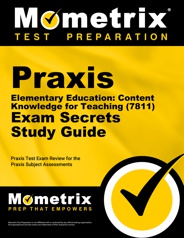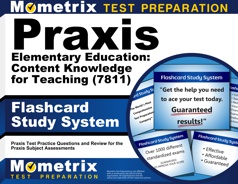The Praxis Elementary Education Content Knowledge for Teaching (CKT) exam is designed to measure the knowledge and skills that are essential for educators seeking a generalist elementary school license.
Click “Start Test” above to take a free Praxis 7811 practice test, and check out our premium-quality Praxis test prep resources by clicking the links below!
Exam Outline
The Praxis Elementary Education CKT exam is split into four CKT subtests and contains a total of 222 questions. Each subtest is timed separately, and you will be given a total time limit of 4 hours and 45 minutes.
Reading and Language Arts CKT (7812)
This subtest contains 63 selected-response and numeric entry questions and has a time limit of 90 minutes.
The questions are grouped into three categories:
I. Foundational Literacy Skills (19 questions)
- Print concepts
- Alphabetic principle
- Phonological awareness
- Phonics and word recognition
- Fluency
II. Language (9 questions)
- Conventions of standard American English
- Vocabulary
- Forms and Functions of Language
III. Constructing Meaning (35 questions)
- Key Ideas and Details
- Authors’ craft and text structure
- Integration and application of knowledge
- Text types
- Production of written texts
- Research to build and present knowledge
- Discussion and collaboration
- Presentation of knowledge and ideas
Mathematics CKT (7813)
This subtest contains 52 selected-response and numeric entry questions and has a time limit of 85 minutes. A four-function calculator will be provided on-screen.
The questions are grouped into four categories:
I. Counting and Operations with Whole Numbers (16 questions)
- Counts and skip counts
- Cardinality
- Corresponding numbers to objects being counted
- Subitizing
- Representations of addition, subtraction, multiplication, and division
- Solving mathematical problems involving the four operations
II. Place Value and Decimals (13 questions)
- The value of digits in a number
- Multidigit and decimal numbers
- Rounding numbers
- Composing and decomposing multidigit numbers into groupings
- Using manipulatives to represent place value
III. Fractions, Operations with Fractions, and Ratios (13 questions)
- Fractions as part-whole relationships
- Fractions as ratios
- Characteristics of fractions that are less than one and greater than one
- Fraction equivalence
- Equipartitioning
- Adding, subtracting, multiplying, and dividing with fractions and whole numbers
IV. Early Equations and Expressions, Measurement, and Geometry (10 questions)
- What it means for algebraic terms, equations, and expressions to be considered equivalent
- Determining whether equations are true
- Standard order of operations
- Awareness of different interpretations of the word variable
- Using the greater-than (>) and less-than (<) symbols to compare quantities
- Describing measurable attributes of objects
- Calculating and estimating perimeter, area, and volume
- Calculating and estimating measurements of angles
- Converting between measurement units
- Shapes and their attributes
- Composing and decomposing shapes
- Lines, line segments, angles, and rays in two-dimensional figures
Science CKT (7814)
This subtest contains 47 selected-response questions and has a time limit of 60 minutes.
The questions are grouped into four categories:
I. Earth and Space Sciences (11-15 questions)
- Earth’s place in the universe
- Earth’s systems
- Earth and human activity
II. Life Sciences (13-17 questions)
- From molecules to organisms: structures and processes
- Ecosystems: interactions, energy, and dynamics
- Heredity: inheritance and variation of traits
- Biological evolution: unity and diversity
III. Physical Sciences (13-17 questions)
- Matter and its interactions
- Motion and stability: forces and interactions
- Energy
- Waves and their application in technologies for information transfer
IV. Early Equations and Expressions, Measurement, and GeometryCategory IV is used solely for scoring purposes. Questions in this category cover topics in the previous three categories.
- Defining and delimiting an engineering problem
- Developing possible solutions
- Optimizing the design solution
Social Studies CKT (7815)
This subtest contains 60 selected-response and numeric entry questions and has a time limit of 50 minutes.
The questions are grouped into four categories:
I. History (16 questions)
- Chronology
- Contributions of classical civilizations
- Causes and effects of European exploration and colonization of North America
- The conflicts between the American colonies and Great Britain that led to American independence
- The development of the US government
- Important developments in the US during the 20th and 21st centuries
II. Government and Citizenship (16 questions)
- Concepts of family and community
- Purposes and functions of government
- Various forms and levels of government
- Characteristics of responsible citizenship
- Important ideas in the Constitution and the Declaration of Independence
III. Human and Physical Geography (14 questions)
- Concepts of location, direction, and distance
- Physical and human characteristics of place
- Similarities and differences between and among people
IV. Economics (14 questions)
- The ways in which human needs are met
- Goods and services and the roles of producers and consumers
- Purposes of earning, saving, and spending money
- How businesses operate
- Patterns of economic activities in the US and across the world
Check Out Mometrix's Praxis Study Guide
Get practice questions, video tutorials, and detailed study lessons
Get Your Study Guide
Registration
To register for the Praxis Elementary Education Content Knowledge for Teaching exam, you will need to create an online account with ETS. Through this account, you can submit an application to take the exam.
During registration, you will be asked to select the test-taking format (remote or at a testing center), test location (if you are taking the test at a testing center), and test date. You will also need to pay the $209 exam fee.
Test Day
In-person Testing
On the day of your exam, you should plan to arrive at the testing center 30 minutes before the scheduled testing appointment. For the check-in process, you will be asked to provide a printed copy of your admission ticket and two forms of valid identification.
You will also be asked to store all personal items, such as your cell phone, wallet, and keys, in a secure locker before entering the testing area.
Once the check-in process is complete and you are fully approved for testing, you will be led to the testing station and given a brief tutorial on the testing system.
Remote Testing
To take the exam remotely, you must use a laptop or desktop computer that has the ETS Secure Test Browser downloaded and installed on it. This is the browser you must use to take the exam. You will also need a functioning webcam, speakers, and a microphone.
When you check in to take the exam, the remote proctor will ask you to show proof of identification and to move your webcam around the room so that your testing area can be observed. Once the proctor has approved your testing area, they will walk you through the testing process and begin your exam.
How the Exam is Scored
Your Praxis Elementary Education Content Knowledge for Teaching exam score is based on the number of questions you answer correctly (your raw score). Your raw score is converted to a scaled score. The scaled score you need to obtain differs slightly depending on which state you take the exam in.
You should receive an official score report about five weeks after testing.
Check Out Mometrix's Praxis Flashcards
Get complex subjects broken down into easily understandable concepts
Get Your Flashcards
FAQs
Q
How many questions are on the Praxis 7811 exam?
A
There are 222 questions on the exam.
Q
How long is the Praxis 7811 exam?
A
The overall time limit for this exam is 4 hours and 45 minutes.
Q
What is the passing score for the Praxis 7811 exam?
A
The passing score requirements for this exam are different depending on which state you take the exam in.
Q
How much does the Praxis 7811 exam cost?
A
The examination fee is $209.
